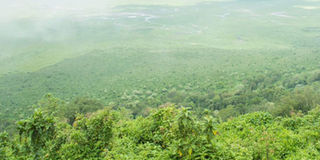It is entirely up to us to protect the environment

What you need to know:
Here are some sobering facts about the state of the environment: About 92,000 hectares of forest are lost each year through forest fires and tree cutting. It is estimated that nearly 90 per cent of the population still depends on charcoal and firewood as a major source of energy for cooking.
There is an entrenched tendency to neglect environmental issues—be it cleanliness in neighbourhoods, pollution, poor sanitation, tree-felling or forest conservation. The sad reality is that we still have a long way to go if we are to pass on a better and sustainable environment to future generations.
Here are some sobering facts about the state of the environment: About 92,000 hectares of forest are lost each year through forest fires and tree cutting. It is estimated that nearly 90 per cent of the population still depends on charcoal and firewood as a major source of energy for cooking.
But there are no tree plantations created specifically for the charcoal market. This puts about 65 per cent of Tanzania at risk of drought if we do nothing to end the destruction.
We urgently need to reduce dependency on charcoal and firewood as a source of energy in both rural and urban areas. We can do so only by introducing alternative sources of energy such as natural gas and solar power.
It is encouraging to note that domestic used of liquefied petroleum gas (LPG) has increased exponentially in recent years, particularly in urban areas. Reducing tax on gas cookers and LPG itself could go a long way in encouraging even more people to abandon charcoal and firewood.
Raising awareness on preserving the environment will be necessary if the people are to become sensitive to environmental risks. Equipping them with alternative sources of income is also crucial.
The people should be encouraged to take up sustainable environmental projects such as eco-villages and a clean development mechanism aimed at creating environment-friendly villages by planting trees, preserving water sources and reducing carbon emission.
We all have a crucial role to play ensuring that we live in clean and wholesome villages, towns and cities.
Do more to improve literacy
Literacy is empowering. The ability to read, write and count enables people to fully participate in society. Tanzania is among the lowly ranked countries in literacy and recent statistics shows that the country sits 179th out 215 nations.
It is appalling, but we can still wear a smile following news that illiteracy in the country is going down, thanks to efforts by various education stakeholders.
Speaking during the International Literacy Day
On Friday, Aga Khan University’s Prof Joel Lugalla admitted that literacy rate is on the rise. Prof Lugalla, however, said a lot should still be done to do away with the challenge of reading, writing and counting in both rural and urban areas.
It is difficult to comprehend that after 56 years of independence, there are still millions of Tanzanians who cannot read and write.
The Ministry of Education has implemented several programmes to increase literacy. Kudos to them, but they still have a long way to achieve what the Father of the Nation, Mwalimu Julius Nyerere stood for.
More public libraries and literacy programmes should our focus. Illiteracy and general lack of education is always the root cause for many of society’s problems. It has a profound impact on virtually every aspect of people’s lives.




